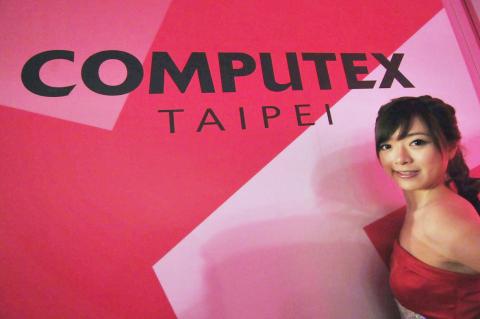Taiwanese computer makers’ sales are likely to improve in the second half of this year on the back of launches of new tablet computers, the Taipei Computer Association (台北市電腦公會) said yesterday.
“Sales in the first half of the year were a bit disappointing as a result of the economic situation in Europe and the declining worldwide notebook market,” association deputy director-general Chang Li (張笠) said.
“However, companies are flexible in adjusting their production to manufacturing tablets, which are popular in emerging markets because of their low prices and reliable quality,” Chang said at the sidelines of the opening ceremony of the annual Computex trade fair.

Photo: Mandy Cheng, AFP
Chang said the nation’s information technology industry will remain competitive because of the extensive supply-chain companies in Taiwan, on which competing Apple, Android and Windows camps have relied to complete their products.
Taiwanese companies respond quicker to the latest trends than Japanese companies.
In addition, they are more innovative and do not have as many patent problems as their Chinese counterparts, Chang said.
Furthermore, as South Korean companies are developing their own brands, other companies are more cautious when doing business with them because they might have to compete with South Korean companies in the future, he said.
According to the association, in addition to the 1,724 exhibitors at this year’s Computex, there are 200 more companies in Taiwan that are looking to participate in the show.
“The extensive supply chains of 2,000 design houses and manufacturers in Taiwan are the nation’s strongest point,” Chang said.
Walter Yeh (葉明水), executive vice president of the Taiwan External Trade Development Council (TAITRA, 外貿協會), a co-organizer of Computex, said this year’s show could create sales of US$25 billion, about the same as last year.
The show has attracted 38,000 international buyers, up 10 percent from last year, Yeh said.
According to Yeh, the scale of the exhibition will remain the same until 2016, when more exhibition centers are set to open.
Computex will be run from today through Saturday at the Taipei World Trade Center (TWTC) Nangang Exhibition Hall in Nangang District (南港) and TWTC Exhibition Hall in Xinyi District (信義).

WEAKER ACTIVITY: The sharpest deterioration was seen in the electronics and optical components sector, with the production index falling 13.2 points to 44.5 Taiwan’s manufacturing sector last month contracted for a second consecutive month, with the purchasing managers’ index (PMI) slipping to 48, reflecting ongoing caution over trade uncertainties, the Chung-Hua Institution for Economic Research (CIER, 中華經濟研究院) said yesterday. The decline reflects growing caution among companies amid uncertainty surrounding US tariffs, semiconductor duties and automotive import levies, and it is also likely linked to fading front-loading activity, CIER president Lien Hsien-ming (連賢明) said. “Some clients have started shifting orders to Southeast Asian countries where tariff regimes are already clear,” Lien told a news conference. Firms across the supply chain are also lowering stock levels to mitigate

IN THE AIR: While most companies said they were committed to North American operations, some added that production and costs would depend on the outcome of a US trade probe Leading local contract electronics makers Wistron Corp (緯創), Quanta Computer Inc (廣達), Inventec Corp (英業達) and Compal Electronics Inc (仁寶) are to maintain their North American expansion plans, despite Washington’s 20 percent tariff on Taiwanese goods. Wistron said it has long maintained a presence in the US, while distributing production across Taiwan, North America, Southeast Asia and Europe. The company is in talks with customers to align capacity with their site preferences, a company official told the Taipei Times by telephone on Friday. The company is still in talks with clients over who would bear the tariff costs, with the outcome pending further

Six Taiwanese companies, including contract chipmaker Taiwan Semiconductor Manufacturing Co (TSMC, 台積電), made the 2025 Fortune Global 500 list of the world’s largest firms by revenue. In a report published by New York-based Fortune magazine on Tuesday, Hon Hai Precision Industry Co (鴻海精密), also known as Foxconn Technology Group (富士康科技集團), ranked highest among Taiwanese firms, placing 28th with revenue of US$213.69 billion. Up 60 spots from last year, TSMC rose to No. 126 with US$90.16 billion in revenue, followed by Quanta Computer Inc (廣達) at 348th, Pegatron Corp (和碩) at 461st, CPC Corp, Taiwan (台灣中油) at 494th and Wistron Corp (緯創) at

NEGOTIATIONS: Semiconductors play an outsized role in Taiwan’s industrial and economic development and are a major driver of the Taiwan-US trade imbalance With US President Donald Trump threatening to impose tariffs on semiconductors, Taiwan is expected to face a significant challenge, as information and communications technology (ICT) products account for more than 70 percent of its exports to the US, Chung-Hua Institution for Economic Research (CIER, 中華經濟研究院) president Lien Hsien-ming (連賢明) said on Friday. Compared with other countries, semiconductors play a disproportionately large role in Taiwan’s industrial and economic development, Lien said. As the sixth-largest contributor to the US trade deficit, Taiwan recorded a US$73.9 billion trade surplus with the US last year — up from US$47.8 billion in 2023 — driven by strong